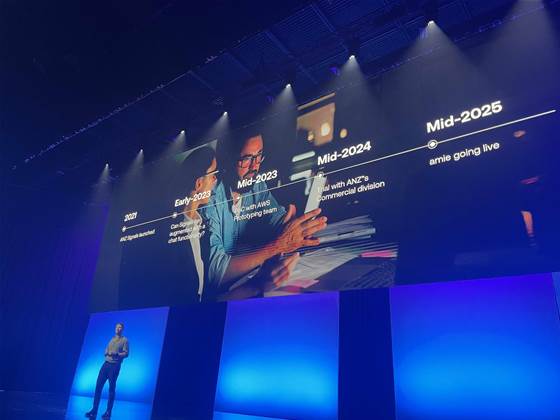ANZ Institutional will shortly go live with a “multi-agent chatbot” for bankers called amie, styled as a “personalised markets analyst” that consolidates knowledge and can dispense it anytime.

Head of digital strategy and financial institutions sales Tim Moloney told AWS Summit in Sydney that the agentic AI tool was developed with a prototyping team from AWS in 2023, before being trialled by commercial bankers last year.
Its go-live is scheduled for “mid-2025”, according to a slide deck, with Moloney confirming the launch of amie - pronounced Amy - is imminent.
“We’re getting ready to go live with amie, which is short for ANZ Markets Insights Engine,” Moloney said.
“At its core, it’s a multi-agent chatbot that … will allow our bankers to ask pretty much anything about markets, whether it’s about research, news, policies, or of course customer analytics.
“We like to think of amie as a personalised markets analyst that our bankers can call on anytime, anywhere.”
Amie integrates with a previous tool that the institutional bank built called Signals, which was built in 2021 to “deliver personalised, actionable market intelligence to our bankers, whether that’s a notification of an upcoming deal maturing or a potential restructuring opportunity.”
“Signals turned us from being reactive with data to proactive, but it was still just a one-way conversation,” Moloney said.
“So early in 2023, we started exploring whether we could augment Signals with chat capability, but pretty quickly worked out that given the diversity and complexity of our underlying data some sort of agent based solution was going to be required.”
An “indicative conversation” shown at the event surfaced a notification from ANZ Research about the Reserve Bank, and had amie proactively prompt institutional bankers to “look at how this might affect your customer portfolios.”
Bankers could then prompt amie to hone in a specific aspect, such as interest rate risk, and have the engine walk through “relevant exposures and opportunities”.
Cloning knowledge
Moloney called attention to a couple of lessons for the bank from its initial foray into AI agents.
A key one is the ability of the bank to capture the knowledge of bankers and essentially “clone” it and share it widely inside of the organisation.
This has been a stated goal of several generations of information management platforms, but ANZ Institutional appears bullish that agentic AI is finally the way to do it.
“Solutions like amie demonstrate that subject matter experts, say an interest rate specialist, can now build an agent that captures their deep domain knowledge, sort of like cloning themselves and their expertise,” Moloney said.
“Those agents can then be deployed across the entire organisation, irrespective of which applications different teams use.
“This federated model scales expertise and not just the underlying technology.”
Balancing trade-offs
Moloney said that the bank is also utilising “different tools and frameworks” to balance trade-offs of time, accuracy and quality of outputs from the agent.
He noted bankers talking to a customer needed information “in seconds, not tens of seconds or minutes, but it can’t be at the expense of quality or accuracy”.
“What we’ve learned is that by utilising different tools and frameworks for different use cases, we’re able to optimise and much better manage those trade-offs,” he said.
“By way of example, our toolkit includes Text2SQL for simpler data retrieval and joins [a SQL instruction for combining datasets, such as tables or columns], things like recent customer activity; function calling for complex analytics such as portfolio restructuring; baseline RAG [retrieval augmented generation] for user research retrieval, and graphRAG for more complex policy and knowledge navigation.”
He also noted that agentic AI appeared to enable organisations to move beyond a key hurdle of the current AI era, saying: “How do you demonstrate real business value with the technology in a way that’s scalable that doesn’t require you to commit to a substantial, usually multi-year, upfront investment?”
“Agents support a modular approach, where each agent can tackle a particular opportunity, and if it’s successful, it just gets added to the stack,” Moloney said.
“Their degree of autonomy can be carefully calibrated to the guardrails required, and benchmarks can be set and tested at both the agent and the application level.
“Of course, this modular approach becomes exponentially more powerful when agents are portable, and the real exotic part at present is not just AI agents becoming a lot smarter, it’s through standardised protocols like MCP [Anthropic’s Model Context Protocol] and other emerging agent to agent frameworks, they’re becoming a lot more portable and interoperable.”
Ry Crozier travelled to Sydney for AWS Summit as a guest of AWS.



.png&h=140&w=231&c=1&s=0)
_(23).jpg&h=140&w=231&c=1&s=0)
_(20).jpg&h=140&w=231&c=1&s=0)




_(26).jpg&w=100&c=1&s=0)
 iTnews Executive Retreat - Security Leaders Edition
iTnews Executive Retreat - Security Leaders Edition












_(1).jpg&h=140&w=231&c=1&s=0)



